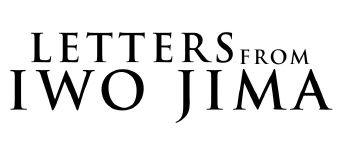

A priceless and near-perfect epic drama courtesy of Yamashita and Eastwood
PopcornReel.com Film Review: "Letters From Iwo Jima"
By Omar P.L. Moore/December 20, 2006


A priceless and near-perfect epic drama courtesy of Yamashita and Eastwood
PopcornReel.com Film Review: "Letters From Iwo Jima"
By Omar P.L. Moore/December 20, 2006
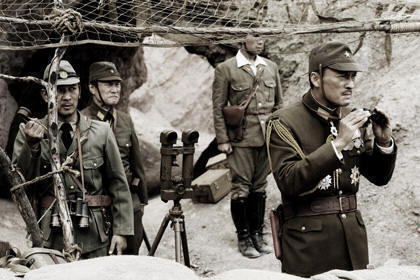

Lt. General Kuribayashi, a real-life general in the Battle of Iwo Jima in 1945,
is portrayed by Ken Watanabe, who helped Clint Eastwood in many areas of the
film.
(All photos: Merie W. Wallace/Warner Brothers)
"Letters" logo above: 2006 Warner Brothers Entertainment.
All Rights Reserved.
There are special films that make lasting
imprints and this is one of those films. It belongs to Clint Eastwood, who
has been directing for as long as he has acted, if not longer. For all his
iconic acting presence, narrowing eyes and weathered grandeur however, Mr.
Eastwood is a supremely able director and his stature grows far beyond his own
legendary heights. His love of film shines beyond brightness with this
glorious World War Two epic, "Letters From Iwo Jima" one of the year's very best
films. Mr. Eastwood has Iris Yamashita to thank for her major contribution
to this beautiful piece of cinema. Yamashita, a second-generation
Japanese-American, adapted from "Picture Letters From Commander In Chief" -- the
actual book of letters by the real-life general Tadamichi Kuribayashi -- into
this masterpiece. The director's artistry has never been stronger.
"Letters From Iwo Jima" is not just a companion film to Mr. Eastwood's earlier
"Flags Of Our Fathers", it is a film that will cement its place as an instant
classic. Mr. Eastwood returns to the great bygone days of storytelling,
back when visual effects were little and any effects would be less than subtle,
back when just quiet conversations and observations carried the day and gently
pushed along a picture. In this story from the Japanese perspective,
"Letters" tracks the last vestiges of a troop of the Empire army as it fights
more for honor and pride than for any victory over the oncoming American forces.
It is more than worth remembering some very harsh realities: Over 20,000
Japanese died fighting for their country and fighting on their soil and almost
40 days passed until they were defeated. Many thought that the Battle Of
Iwo Jima in 1945 would be a cakewalk for American troops, of whom about 7,000
perished, but the Japanese fought valiantly to the very bloody end.
"Letters From Iwo Jima" shows this in graphic ways as the vagaries of war are
supposed to, but spends more time most importantly delving into the
relationships of the men who are fighting for their country but fighting for
their hearts and loved ones on the mainland.
Several characters' stories are told including the story of a baker, Saigo (Kazunari
Ninomiya), Baron Nishi (Tsuyoshi Ihara), Shimizu (Ryo Kase) and Lt. Ito (Shidou
Nakamura). The anchor to the narrative is Lt. General Tadamichi
Kuribayashi (Ken Watanabe). Worldly, he is a connoisseur of travel and a
tower of strength and leadership. In his travels to distant lands like
America he has acquired an understanding of the ways of the enemy and as well as
the sad fact that in war there are only losers with vacant hearts: families of
the departed, and the lost (the deceased in battle). "Letters" does an
effective job of conveying all of these characters -- one a man who promises to
return home to his yet unborn child and wife Hanako (Nae); another whose
equestrian skills from the 1932 Olympics are second-to-none (his horse Uranus is
his prized possession); another whose disgrace as a former military policeman
still haunts, and finally an ultra-regimented military man whose die-hard rather
take suicide than defeat coda is strictly adhered to.
Emblematic of this sterling film is its careful research. The film's
production notes reveal that Robert Lorenz and Eastwood (two of "Letters"
producers, Steven Spielberg is the other) went to Tokyo with Yamashita's
screenplay and met with several authorities on the Battle Of Iwo Jima, and sat
down with relatives of the real-life characters depicted in the film, and
received an abundance of information that further authenticated and verified the
events of the war as the script depicted them.
"Letters From Iwo Jima" is expertly crafted, directed with an incredible precision and languor, making
this film an instant classic. Its pace is a salute to the great
filmmaking of yesteryear, the type of quietly profound storytelling of which
great war epics are made. The cinematography has a texture that is deeply
felt -- a color drain that is a plausible metaphor for yesterday's war but also
for the colorless existence of going into battle to what was certain death.
Tom Stern accomplishes a marvelous feat with his cinematic vision. The
film flickers into black and white on occasion. "Letters" is a film that
is authentic in feeling, mood and tone. It is also moving. The film
features music by the director.
One scene near the end which features a cacophony of voices in echo, is purely
remarkable. There is so much more to express about this motion picture,
but seeing the film is expresses much more than even the most well-known, most
accomplished of reviewers ever could. The film, which has already been
praised in Japan for its amazingly accurate depictions of the Japanese
experience in the Battle Of Iwo Jima, has won over many citizens in the land of
the rising sun. Even the film's star Ken Watanabe ("The Last Samurai") who
helped Eastwood immeasurably in many areas with the film, not just through his
acting, was quoted as saying that he felt "embarrassed" that the Japanese film
industry (which is struggling these days) could not have made a film like this
about this experience some time ago. Politics, pride, economics and
national memory may have a lot to do with it, as an answer to Mr. Watanabe's
question. Mr. Watanabe is brilliant as General Kuribayashi, and the other
actors across the board leave the audience with vivid characters not soon
forgotten.
"Letters From Iwo Jima" has its flaws, some of which involve the way
the American side of the conflict and the point of view of American soldiers
creeps in at times (did co-writer Paul Haggis have anything to do with that?) but one thing that is
certain -- the older Clint Eastwood gets, the better he gets. And for us
(as well as him) that is excellent news.
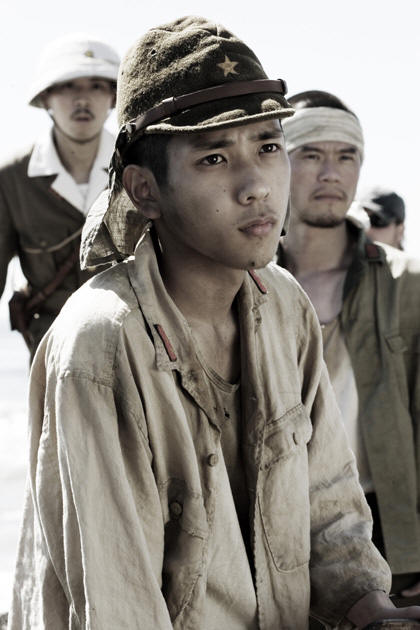
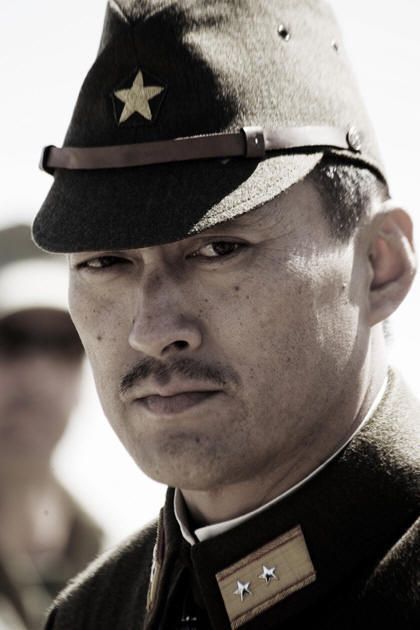
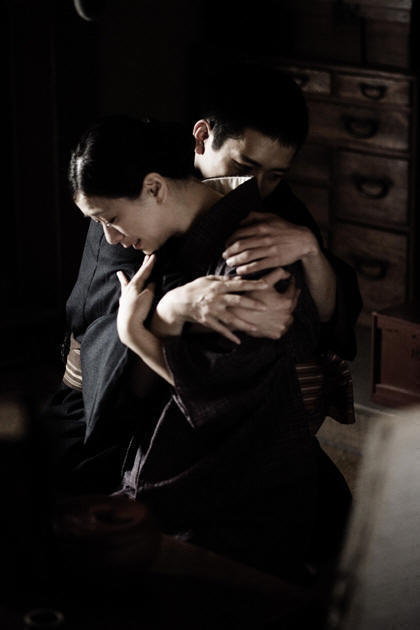
Faces of War and Family: Kazunari Ninomiya (as Saigo), Ken Watanabe (as Lt. Gen.
Kuribayashi) and Nae (as Hannah), embraced by Mr. Kazunari.
"Letters From Iwo Jima" is rated R by the Motion Picture Association of America for graphic war violence. The film's duration is two hours and 20 minutes. The film opened in Japan on December 9 and opened today in New York, San Francisco and Los Angeles. Several countries and continents, including the rest of North America will get to see the film, as it will open over the coming weeks and months.
Copyright 2006. PopcornReel.com. All Rights Reserved.